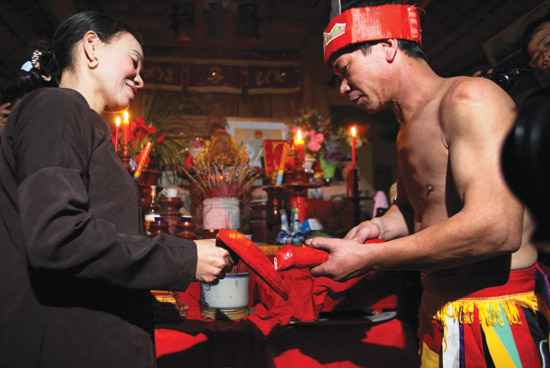(No.4, Vol.3, May 2013 Vietnam Heritage Magazine)
The act of knocking a pounder on a triangular tablet at Tu Xa festival
The rites of fertility of the primitive peoples of ancient Vietnam used to be found in many spring festivals. At present, probably the only surviving vestige of these rites is found in Tu Xa Commune in the District of Lam Thao in Phu Tho Province, 100 kilometres northwest of Hanoi.
The festival of Tu Xa Village lasts from the 10th to the 12th days of the first lunar month. Shows, played from midnight to dawn, include the fertility rites in prayers for the peace and happiness of the people and the abundance of the race, the rite of procession of the paddy goddess for the good harvest, beneficent weather, and propitious crop, and the show about the four social categories of scholars, farmers, artisans, and traders.
In 2001, Huu Ngoc went to the festival and described as follows in his book Wandering Through Vietnamese Culture, published by The Gioi Publishers, 2004:
‘The master of ceremonies pronounced a sacramental formula, made four kowtows and then took from the altar a sacred box, from which he solemnly drew out some votive objects: a triangular tablet representing the female genitalia and a small wooden pounder vaguely suggesting the male organ.
On an order from another official he intoned: ‘Linh tinh tình ph?c’, and then a young man knocked three times with the pounder on the triangular tablet, held by a girl. All the lights suddenly went out.
In the ancient ritual, all lights were extinguished so that the sacred act of copulation was done gropingly in complete darkness. The officiating man shouted for light only after having heard three beats on a tom-tom.
After some minutes of darkness, the gongs and tom-toms burst out in a deafening fanfare. The official ran three times around the temple followed by a crowd shouting at the top of their voices and beating bamboo baskets to drive away the evil spirits and bad luck.
That evening we watched the scene in full light, the lamps being not put out – probably on the request of the cameramen.
In the old days, following the rite, everyone was allowed to indulge in free love in the forest. The girls who became pregnant that night were considered privileged, the village organised their marriage, and they were exempted from any matrimonial fines.’
For a long time, the festival of Tu Xa was criticized as decadent, and fell out of fashion. At the beginning of the 1990s, the festival of Tu Xa was gradually resumed, but only after 2000 was this unique festival has been officially resumed.
Following are some words from the songs of the four social categories:
A farming girl sings:
‘People go planting for their work,
I go planting to get the home-owner.
To plant rice-seedlings, I have to upturn my bottom.
And lower my head to get a good harvest.’
The song of the carpenter is full of concrete details:
‘People go to cut trees in the forest, I go to saw a girl, young and virgin.’
A trader is more sophisticated in his words:
‘When in youth, buy your youthful spring.
If you delay, your spring will go away.’
And the clowns, both male and female are more facetious:
‘Now I am asking you,
What is hanging dangling in your trousers?’

